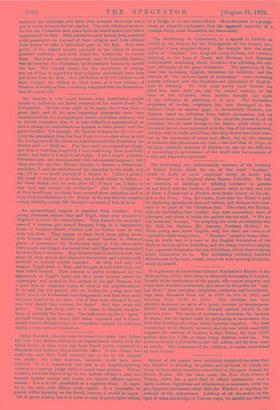The Archbishop was unfortunately unaware of the intensity of Indian
feeling about the use of this word "heathen," which in India is never employed except in insult, just as " idolater " is in England about Roman Catholics. He had no intention of insulting or refusing tolerance to persons of any belief, but the Indians in London think he had, and two of them, a Parsee and a Hinddo, write fierce letters on the sub- ject to the Times. One, the Parsee, hints that his Grace is paid for declaring opinions he does not believe, and declares that toler- ance is no part of the Christian plan. The other, the Hindoo, tells the Archbishop that heathen men hate inaccuracy, want of tolerance, and abuse of books the satirist has not read. "We are not heathens," he says, "for adopting the views of celebrities like Mr. Mill, Mr. Spencer, Mr. Darwin, Professor Huxley," &c. These young men know English well, but there are nuances of expression which escape them. " Heathen " properly means idola- ters, no doubt, but it is used in the English translation of the Bible to include all but Israelites, and the clergy therefore employ it as a general designation for non-Christians, which these students admit themselves to be. The Archbishop evidently included Mussulmans in the word, which, except he were quoting Scripture, would be absurd.


































 Previous page
Previous page